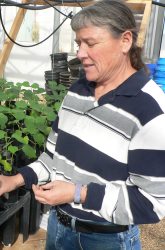
Terry Wheeler graduated with a MS from Texas A&M University in plant pathology and then a PhD from North Carolina State University in plant pathology. Both degrees were obtained with a specialization in plant nematology; work was conducted with root-knot nematode species on tobacco and peanut. Dr. Wheeler then worked as a research associate at the Ohio Agricultural Research and Extension Center in Wooster on potato early dying (a disease complex involving Verticillium wilt and lesion nematode) and then at Ohio State University on the soybean cyst nematode. In 1994, Dr. Wheeler moved to Lubbock, Texas, to work on cotton and peanut diseases in the southern High Plains of Texas for the Texas Agricultural Experiment Station (later renamed Texas A&M AgriLife Research). Nematodes are one of the most important and consistent issues facing cotton production in this region, and Dr. Wheeler has worked extensively in nematode management (chemical, germplasm, and crop rotation) with both the root-knot and the reniform nematodes.
Terry Wheeler graduated with a MS from Texas A&M University in plant pathology and then a PhD from North Carolina State University in plant pathology. Both degrees were obtained with a specialization in plant nematology; work was conducted with root-knot nematode species on tobacco and peanut. Dr. Wheeler then worked as a research associate at the Ohio Agricultural Research and Extension Center in Wooster on potato early dying (a disease complex involving Verticillium wilt and lesion nematode) and then at Ohio State University on the soybean cyst nematode. In 1994, Dr. Wheeler moved to Lubbock, Texas, to work on cotton and peanut diseases in the southern High Plains of Texas for the Texas Agricultural Experiment Station (later renamed Texas A&M AgriLife Research). Nematodes are one of the most important and consistent issues facing cotton production in this region, and Dr. Wheeler has worked extensively in nematode management (chemical, germplasm, and crop rotation) with both the root-knot and the reniform nematodes.
